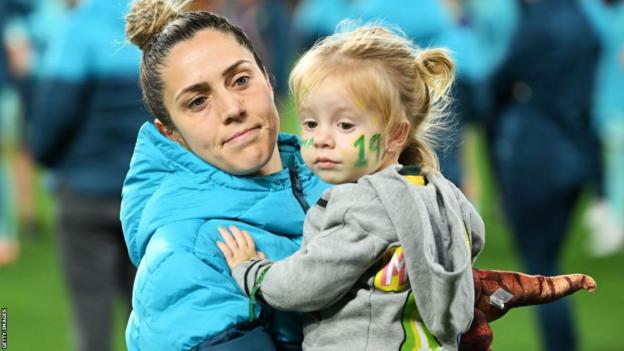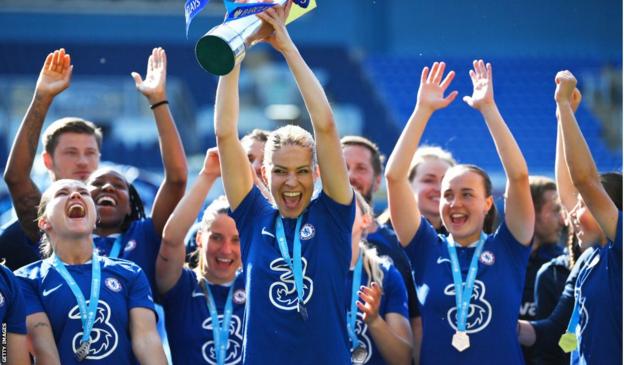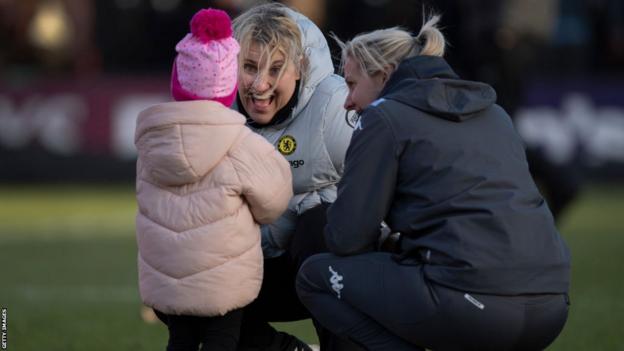“I was unable to discuss it” – a controversial choice causing division in the Women’s Super League

Sign up for notifications to the latest Insight features via the BBC Sport app and find the most recent in the series.
“It was all I thought about and dreamed about. I thought about names every minute. I just knew there was something missing. So I went to an IVF clinic and four weeks later I was pregnant.”
Katrina Gorry’s life changed completely after that.
Her home nation Australia was set to host a first Women’s World Cup less than two years later but Gorry was prepared to give up a lifelong dream to become a mother.
“It all went really quickly. I didn’t really have to think about who I wanted to tell. I kept it to myself. I didn’t really care about football at that time,” Gorry told BBC Sport.
“For as long as I can remember, I thought I would have to hang up the boots to start a family.
“But I knew I was in the right place. I knew that I wanted to be pregnant and I wanted to have a little one. And everything fell into place.
“The national team were super supportive. They said they would be there if I wanted to return to football. At that time I didn’t – I was pretty happy just giving it up.
“But when I was pregnant I started watching it more; I started getting more invested. Afterwards I started thinking about getting back to the game.
“I felt like I loved it more than I ever had before.”
Gorry embarked on a journey as a single mother while playing for Brisbane Roar in 2021, before meeting her current partner Clara.
They now live in London after Gorry joined West Ham in January from Swedish club Vittsjo GIK, having made a return to football only three months after giving birth to daughter Harper, who is now two.
Gorry achieved her football dream, helping Australia reach the semi-finals of the World Cup on home soil in 2023, and she has more excitement to come – Clara is expecting a baby boy.
“I’m known more as Harper’s mum now than as a football player – that’s the most special part,” said Gorry, who is currently recovering from a season-ending ankle injury.
“I wanted to be a mum for so long. I knew Harper was going to be special just because of how much I wanted her. I had her alone and we got to develop the most incredible relationship.”

It has not been easy for Gorry. She wasn’t sure if she could juggle life as a professional footballer and motherhood. It is not something that is widely spoken about outside of the United States.
In November 2022 England striker Toni Duggan told BBC Sport: “I don’t think women’s football is ready for women to be pregnant.”
A BBC Sport study released in March found that a third of British female athletes from all sports said they delayed starting a family because of their sporting career.
But Gorry embraced motherhood, moving to Sweden when Harper was six months old and facing challenges like going to the supermarket in a foreign country and trying to find the right baby food.
“I remember getting there for the first three weeks and thinking ‘gosh, what have I got myself into?’ The club were incredible. But it was scary,” added Gorry.
She was driving to a Women’s Super League game this year, preparing to face Manchester United, when Harper was sick in the back seat of the car. Gorry called West Ham boss Rehanne Skinner immediately.
“There was no panic in her voice whatsoever. It was like ‘You just do what you need to do. We’ll be here when you need us. We have everything ready,'” said Gorry.
“Pretty much as soon as I walked in the dressing room everyone got around me. All the girls asked if Harper was OK and if I needed anything. I ran on and off I went. We won too.”
There is a growing number of mothers in the WSL. West Ham captain Dagny Brynjarsdottir has had two boys – the club released a documentary on her journey this year – while Everton’s Duggan became the first high-profile English player to become a mother when she gave birth to daughter Luella in March 2023.
Arsenal’s Amanda Ilestedt announced in March that she was expecting a child, following Chelsea midfielder Melanie Leupolz’s revelation in March 2022, a month after it was agreed players in the top two tiers of women’s football in England would receive improved maternity pay.
The new agreement now forms part of WSL clubs’ licensing agreements. Players are paid 100% of their weekly wage, as well as any other remuneration and benefits for the first 14 weeks, before dropping to the statutory rate (about £173 a week).
Finances, structural obstacles and childcare are just some of the barriers to female footballers in the WSL, but overcoming physical challenges of returning following pregnancy is something that differs hugely to male players when they become fathers.
Morning sickness, which Duggan suffered from greatly, exhaustion and changing body shapes are some of the effects of carrying a baby.
Research from the Guardian in 2023 found that pregnancy also “elevates levels of hormones such as relaxin, which loosens ligaments and joints, potentially increasing the risk of injury”.
Gorry said she had “no doubt in her body” to perform upon returning, but it is different for every female, with WSL clubs constantly researching how best to support returning mothers.

Meanwhile, Chelsea’s Leupolz said it is “crazy what our human bodies are able to do”.
“I would say sleeping was really difficult in the beginning. My son wasn’t a good sleeper and I would go to training super tired,” Leupolz said.
“But even if I was super tired, I was still able to train at the highest level. That is something that was completely different to what I was used to before. Normally I slept 10 hours.
“Your body changes, your life changes, but it’s still possible to do both.”
Leupolz thinks her decision to carry a son at the age of 26, while playing for Germany and at the peak of her career, may have surprised people.
Her pregnancy was announced just months before Euro 2022, in which Germany went on to lose to England in the final with Leupolz absent while recovering from childbirth.
“I couldn’t really speak about it because, as a professional athlete, everyone expects you to play football for as long as you can and at the highest level you can,” she said.
“I was aware that maybe I wouldn’t come back on the same level, but with the support from (manager) Emma (Hayes) and Chelsea, it was possible.
“We are really lucky to play football. It is an amazing job and so many people want to be in our position. Maybe they don’t understand the decision to have a family.
“But it is our own decision and we are all women. It’s pretty normal that you would want to have a child and maybe even when you’re still young.
“It was my thought – I really wanted to have a child while I was still young. It’s even better that I came back to football and that I’m able to play at the same level again.”
Leupolz took inspiration from USA legend Alex Morgan, one of several mothers who have competed at a World Cup after giving birth.
United States stars have had nannies and creches provided for them while at major tournaments and they have long set the standards for motherhood support in football – but it is not the case everywhere.
“I think being worried is absolutely understandable because there’s not much support from other clubs or federations. I was really lucky with Chelsea,” said Leupolz.
“You hear of many bad stories in Europe of players who didn’t get that support at all. I really appreciate what Chelsea did for me.
“I think it’s just understanding the support around football. It’s not what happens on the pitch. We are footballers that have to compete – and that shouldn’t change.
“If someone wants to be a mum I think it’s important they see it is possible. When we came back, we tried to be role models. It gives others confidence that they can do it as well.
“I would be happy to see more mums in football.”

The physical challenges of giving birth, recovering and conditioning your body to return to elite sport is immense but motherhood also takes its toll emotionally – on coaches as well as players.
There are four female managers in the WSL and two of them are mothers.
Chelsea boss Hayes will leave at the end of the season to manage the US, with a better work-life balance for her son Harry, five, a factor in her decision to leave club management.
Aston Villa’s Carla Ward is also a mother and she admits the relentless nature of her role in the WSL may not be sustainable generally, despite great support from her club.
Ward lives in Sheffield with her daughter Hartley, four, and has negotiated an early finish at work every Wednesday so she can pick her up from school – but she still misses out on plenty of milestones.
“I might not see her for days and that becomes tough,” Ward said. “You do start to question whether that’s something you can do for the long term. Have I got an answer to that? No.
“Have I questioned whether I can keep doing it? Of course, because she’s my pride and joy and I want to spend time with her. It’s constantly pulling on your head and your heart.
“You go from one extreme because she loves that I’m the Aston Villa manager but doesn’t want me to go to work.
“A few months ago, Hartley said to me ‘Mamma, is it your day off today?’ And I said ‘yes’. She said ‘is it my day off too?’ I said ‘no baby, you have to go to school’. She asked why we never have a day off together and it’s because I work weekends.
“It’s mum guilt. It broke my heart. It’s when I start questioning what I’m doing and what I’m doing it for.
“There’s many times she will ask ‘can we do X, Y and Z?’ and you can’t. I miss parents’ evenings and shows. That’s the bit that I really struggle with.
“I spoke about it with Emma (Hayes). She is leaving club football and you can see why. It’s easier I suppose. It probably suits mothers being in the international set-up more than club management.”
But, while it is a taxing job, Ward sees huge benefits for Hartley.
Her daughter’s pride is Ward’s job is clear. She runs around the house wearing an Aston Villa shirt and telling everyone her mother is the club’s manager.
Ward hopes she can use that to be an inspiration for her daughter.
“I would like to think what I’m doing now is creating a foundation and a base for a better life for her,” added Ward.
“You can be a top professional and a mum. You can be a manager and a head coach.
“The one thing I always want to show – let’s be honest, there’s still a lot of people out there that don’t think women should be in football – is showing Hartley that she can be anything she wants.
“Whether that’s a police officer, a doctor, a nurse, a firefighter – as long as she puts her mind to something and has a smile on her face doing it, it will make me happy.”
You can watch more from these interviews with BBC Sport on the BBC news television channels and across multiple radio stations throughout the week.
Previously on Insight
(The following story may or may not have been edited by NEUSCORP.COM and was generated automatically from a Syndicated Feed. NEUSCORP.COM also bears no responsibility or liability for the content.)






